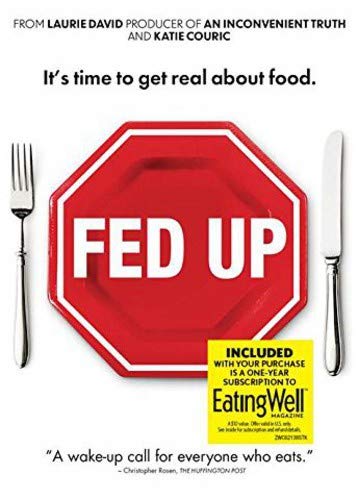
The subject of Stephanie Soechtig’s Fed Up could not be more pressing. The numbers presented in this 2014 documentary are staggering, exploring the root causes of obesity as being significantly more complex than the “calories in, calories out” claptrap often suggested. When one considers that it takes an hour and a half of swimming to work off one medium order of fries, the mind boggles.
Fed Up is at its best when it deals against the conventional wisdom shoveled by the food industry and the government, but its focus is oddly quite narrow. Without question, the health and welfare of children and adolescents is important. But there’s more to the obesity epidemic in the United States than what’s associated with the young and the very young.
The picture opens with narrator and producer Katie Couric offering a brief history lesson about the advent of the “fitness revolution” in 1953. The rise of exercise wisdom, an “exercise balance” that suggests that one has to burn off the calories he or she puts on, is criticized for being the hollow platitude it is. It’s not that exercise isn’t important. It’s that the focus on “active living” is unfair.
Fed Up lays out its case with the help of several talking heads and some of the facts are stunning. Consider, for instance, that between 1977 and 2000 Americans more than doubled their sugar intake. There is added sugar in an estimated 80 percent of food items found on supermarket shelves, so those numbers are far from surprising.
The desk is stacked, without question. With fast food companies making inroads in schools and more than 80 percent of all high schools operating with exclusive contracts with soda corporations, the real surprise is that the problem isn’t bigger. Fed Up argues that things will get worse and it’s hard to challenge such a declaration.
Michelle Obama’s laudable “Let’s Move!” program is addressed as being part of the problem, which is a gripping position. While the “active” portion is lauded, it’s the connections made with the food industry that undermine the need for the program in the first place. An interview with a confused Lisa Gable, the current executive director of the “CEO-led” Health Weight Initiative, drives the point home.
Yet for all the facts and indignation present in Fed Up, it seems a bit scattershot. There’s a lot to focus on, but the documentary seems to stop its outrage machine at adolescents. There’s a real concern for insulating the helpless from disgraceful advertising companies, but what about the adults and senior citizens living in this mess?
Some absolutely stunning pieces of information are simply glossed over, like the notion of being “thin on the outside” but “fat on the inside.” The economics of the argument are weighted; of course, the profit motive is behind the corporations that sell anything to anyone, but what about the economic realities of families forced to eat junk?
The fact is that many Americans are trapped into eating poorly. From the food environment to the concept of “food deserts,” dealt with cogently in the sublime 2012 documentary A Place at the Table, it feels like Fed Up is missing a big piece of the puzzle. The corporations and the governments certainly deserve to be demonized, but the talons are deep.
Sugar’s role as a toxin is explored in detail and there’s some vital information to be found. The soda companies are rightly outed as the devils they are, shilling “reduced fat” versions of their sugary drinks as better alternatives. The trouble with artificial sweeteners is also explored, as is the trouble with “fruit” juice.
Fed Up certainly has its heart in the right place. Childhood obesity is a major concern and the numbers are overwhelming. The battle against the corporations and government officials on the take seems impossible, but the film maintains there’s an object lesson to be found in the way “we” took down the tobacco companies. Maybe so, but the argument seems little more than a bag of hope.
Maybe that’s all there is. Maybe the facts are that industry, government and educational entertainment pieces like Fed Up are so entwined that it’s impossible to tell the facts from the fiction. It admirably debunks the obnoxious mythology of “lazy fat people” and it lines up teens who are trying to the right thing but still fail to lose significant weight. But what’s next?
The documentary’s faults unfortunately keep it from going for the big syrupy jugular. While it fleetingly presents some really striking facts, like the notion that so many insurance companies have bought stock in fast food companies, it doesn’t do enough with its indignation to suggest the kind of change that is really needed.